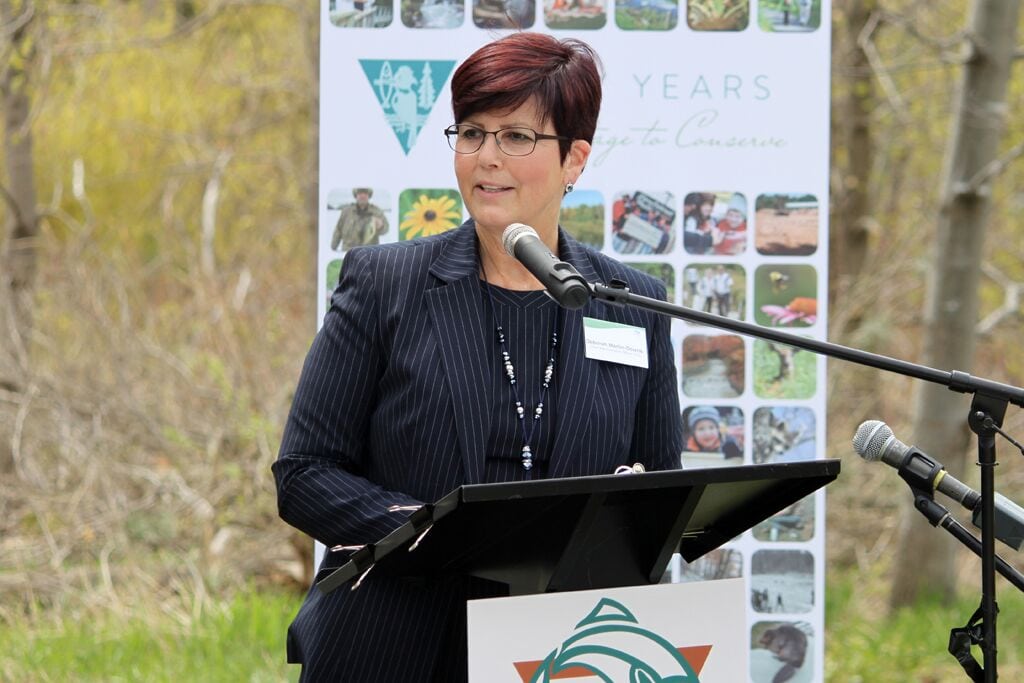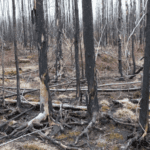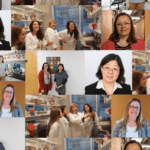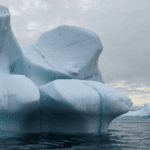Deborah Martin-Downs has never let being a woman get in the way of her ability to do science. “Once I was 8 1/2 months pregnant and out in the field, fish sampling. I could no longer fit in my chest waders but sat on the bank processing the catch. The crew offered to carry my load back to the car but I told them I was pregnant, not sick,” she recalls, proudly.

Martin-Downs earned a BSc in Environmental Studies and Biology from the University of Waterloo in 1979. Though she was asked to do an MSc right away, she wasn’t completely convinced and went on to work in environmental consulting and government for a few years. However, two related factors led to her receiving an NSERC scholarship in 1982 to do an MSc. One was that she wanted to be more than just a technician. The other was that her analyses for the government were revealing significant declines in urban water quality in the Toronto area. The impacts of sewer discharge and storm water drainage on fish communities was something that really interested her.
“I was terrified of fish at the cottage, so my mom was really surprised that I ended up as a fish ecologist,” she recalls. “But I got interested in environmental issues in high school in the early 70s, as it was a time of significant environmental problems. I knew I needed to be part of the response. One of my high school teachers was my inspiration to make a career in environmental science.”
Martin-Downs had thesis support from both the Ontario Ministry of Environment and the Credit Valley Conservation Authority (CVCA), who managed the Credit River watershed in which she was working. Her data were useful to them as they worked to define mitigation and management schemes to deal with these water quality issues.
Martin-Downs graduated from the University of Toronto in 1984 with an MSc in Zoology, but wasn’t guaranteed a job right off the bat. Instead, she created her own jobs. She started by asking the Ministry of Environment to fund an analysis of fish community change, similar to what she’d done for her MSc thesis, but for the Don River. She followed this by teaming up with a colleague from the Toronto Conservation Authority; they were awarded a grant to develop an urban fishing program for use as an education tool, and to promote environmental protection and improvement.
“It was hard to find a job…I needed a network of employed people to help, and they did because of the relevance of the topic to their work,” she explains. “A timely idea, pitched to the right people at the right time, can be very successful for breaking into the field.”
Since those early beginnings, Martin-Downs worked in environmental consulting for 16 years, then spent eight years as the Director of the Ecology Division at the Toronto and Region Conservation Authority. She has now returned to the CVCA as their Chief Administrative Officer, and is responsible for the technical and operational aspects of the CVCA. Martin-Downs is well-suited to this position, as her research interests relate to observing and mitigating land use change impacts on aquatic communities. The CVCA in particular manages a number of exceptional water bodies that are surrounded by urbanization, gravel pits, and other infrastructure.
A commonality across many of Martin-Downs’ career positions is the ability to manage multidisciplinary teams of scientists and engineers. She notes that to be effective in science you need to be interested in other disciplines. “Being able to ‘speak’ another technical language also helps you share your science and be aware of relationships or opportunities to work with other disciplines,” she notes.
She also recommends excellent time management (as did our previous interviewee, Dr. Alwynne Beaudoin), and having the right tools. For example, she was the first in her company to get an email address, which her IT support assured her would be invaluable. “He was right, it was!” she recalls. “A Blackberry, laptop and an internet connection, and I can work anywhere and anytime.”
As a mother of two children, she also had to rely on a supportive family – not just her husband, but also grandparents, aunts, and uncles – to lend a hand with child care. “Children and the sacrifice to be made to have them is really a small blip in the career horizon,” she says. “But the personal rewards are many.”
In terms of women in science, Martin-Downs thinks the biggest societal change is the encouragement of women to pursue sciences over more traditional roles. “My mother was not as supportive as my dad,” she recalls. “She wanted me to get married and have a family. I did that, too – but on my own terms.”
Martin-Downs also notes that she sees more women in the field than when she first started; men are more accustomed to working with women, and there are more rules about work interactions. While her lack of interest in hockey and golf has excluded her from some business activities, she isn’t a fan of affirmative action, saying that women have to be prepared to stand up and be counted. To this end, she recommends women read Sheryl Sandberg’s Lean In.
“I have never given in to the glass ceiling or the biases of male colleagues,” she says. “I’ve pulled my weight, proven my capabilities, and never let others speak for me.” She also believes that women are better managers than men because “they are more tuned to people and their capabilities.”
When asked if she’d do anything differently, Martin-Downs notes that math – particularly statistics and modelling – were never her strong suit. However, as our first interviewee, Dr. Andrea Kirkwood, noted – girls shouldn’t shy away from sciences just because of the math component.
“If I was starting out today I might have gone into environmental law instead and maybe made a few polluters nervous!” concludes Martin-Downs.




